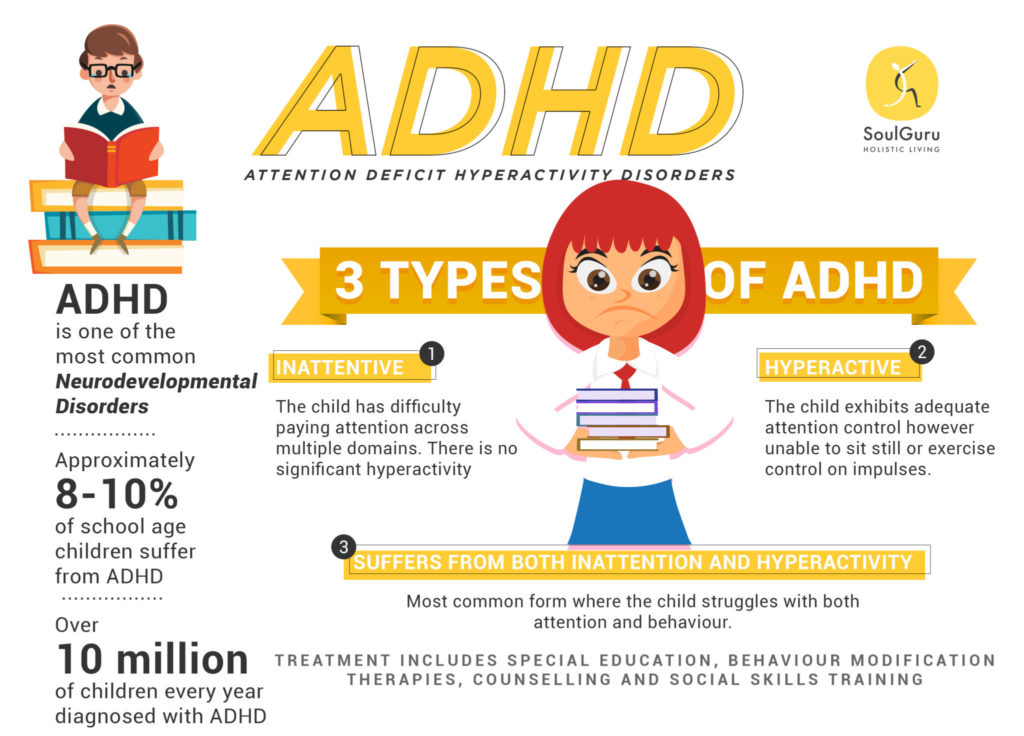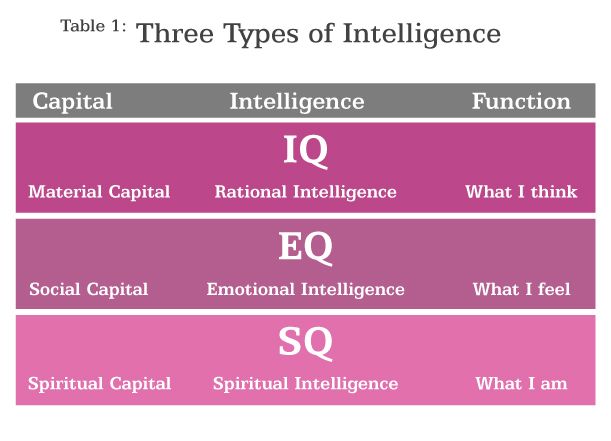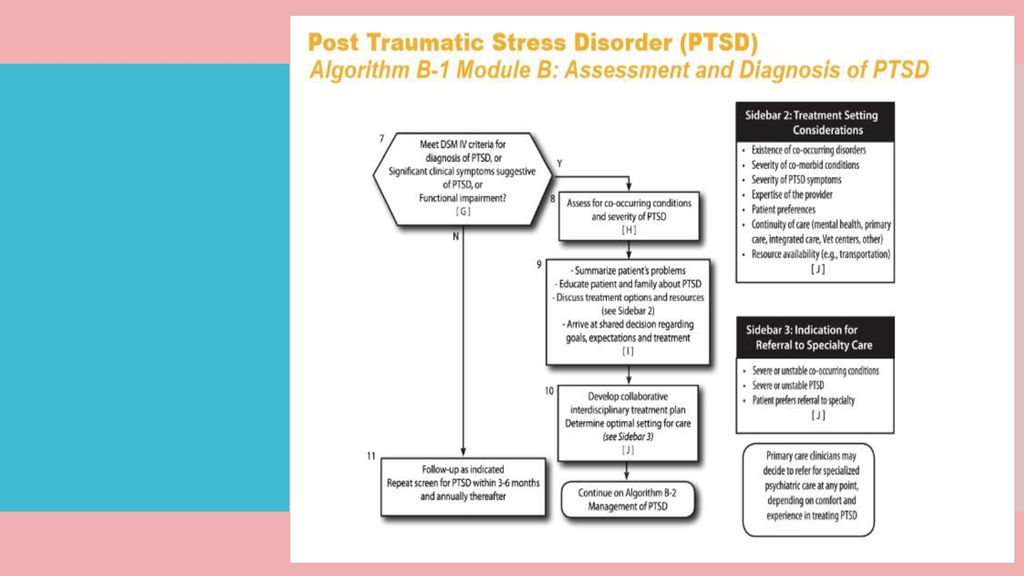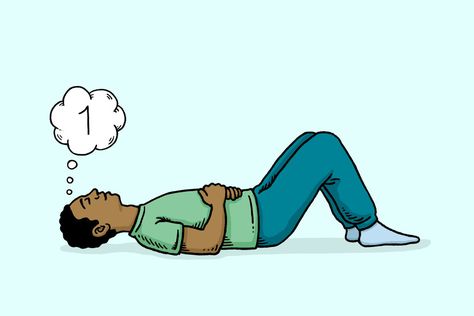Coping with add adhd
Tips for Adults with ADHD
May 11, 2021
If you’re one of the 11 million adults in the United States with adult attention deficit hyperactivity disorder, you understand how hard it can be to avoid distractions, stay organized and work efficiently. With treatment and behavioral changes, you can learn how to handle ADHD to increase productivity and fulfillment. These simple, effective strategies can help you manage symptoms to focus and thrive.
How to Deal With Adult ADHD
Inattention, impulsivity, disorganization, restlessness, overactivity, lack of focus, behavioral control difficulty and other symptoms of attention deficit hyperactivity disorder typically emerge early in life — often before age 12 — and evolve as time goes on.
If you’re older than 18 and experience these symptoms, you’re not alone. ADHD is one of the most prevalent childhood disorders, which continues beyond adolescence for many adults.
The National Institute of Mental Health estimates ADHD’s lifetime prevalence in U.S. adults between 18 and 44 is just over 8%. While children with ADHD are more likely to struggle with impulsivity and hyperactivity, adults with ADHD are more likely to experience memory problems, restlessness and lack of mental focus.
Even though you may find that evidence-based treatments like medication and psychotherapy go a long way to help you manage your condition, learning effective behavioral strategies can give you the power to control your ADHD symptoms in the moment. Here are five tactics you can use daily.
1. Get Organized
If you often spend your day trying to figure out where to start but wind up getting very little done by dinnertime, a new organizational approach might be in order. Organization helps you manage activities and time efficiently, removing distractions and potential frustration from your day.
One strategy for a more organized lifestyle is to start writing down a schedule for yourself every night for the following day.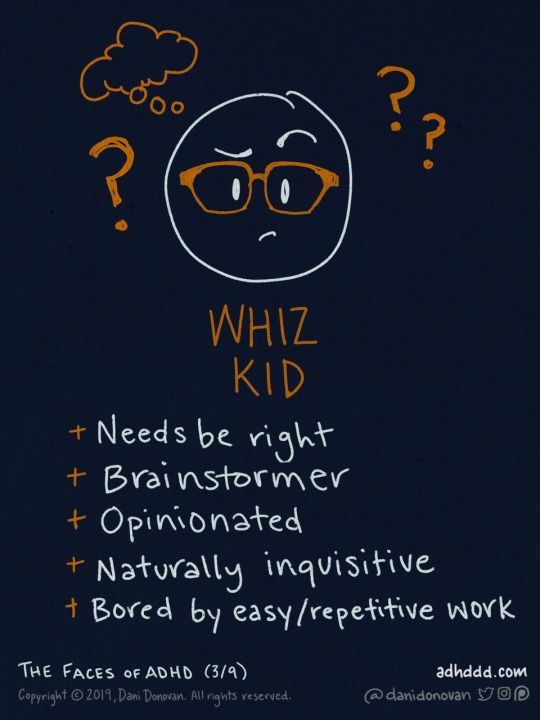 Beginning each morning knowing what to expect gives you control over your responsibilities and activities. The act of crossing out completed tasks boosts a positive sense of accomplishment.
Beginning each morning knowing what to expect gives you control over your responsibilities and activities. The act of crossing out completed tasks boosts a positive sense of accomplishment.
Whether you have to go to work, run errands or tackle household chores, it’s helpful to write down your top priorities so you can start your day strong and refocus when you lose momentum. Create a habit of checking your schedule at consistent times throughout each day — first thing in the morning, a second time at midday and once more in the early evening to see if you need to complete any lingering items before bedtime.
To maximize your chances of success, cluster similar tasks together under the same time umbrella. For example, answer emails and return phone calls once in the morning and once in the afternoon, instead of throughout the day. Also, make sure you create a bit of space in your day to allow for unexpected obstacles.
How to Create an Organized Home for Adults With ADHD
Home organization and tackling clutter can feel intimidating for most people, particularly those with ADHD.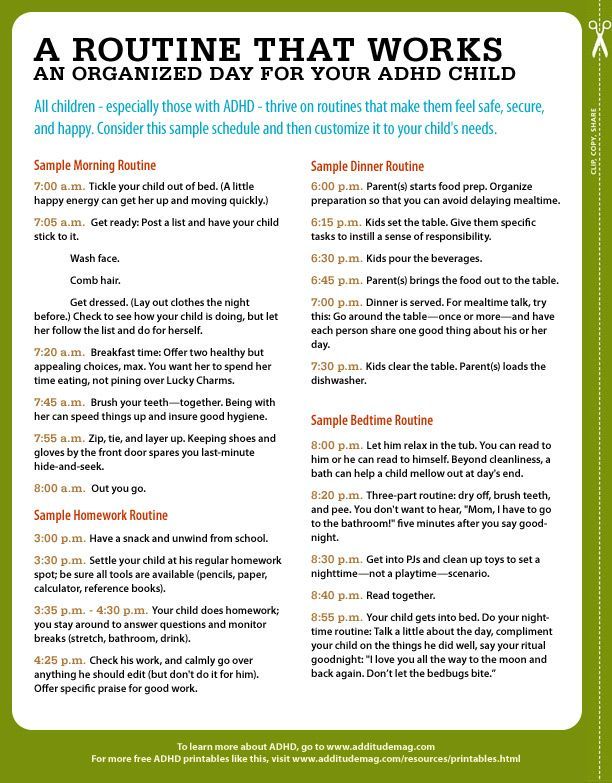 Due to distractibility, decision-making and difficulty with categorizing, adult organizers with ADHD benefit from a targeted approach:
Due to distractibility, decision-making and difficulty with categorizing, adult organizers with ADHD benefit from a targeted approach:
- Focus on only one area or room at a time.
- Schedule specific cleaning and organizing times in your planner — plan to spend only 30 minutes to an hour on each task.
- Categorize boxes for items as you organize — toss, donate and keep.
- When you fill a donation box, make an appointment for that action. Schedule a day and time to take those items to the donation drop-off point.
- If distraction continues to interfere with your goals, hire a sympathetic professional organizer for extra help.
How to Stay Organized With ADHD
To maintain the progress of added structure and your newly decluttered space, follow these tips to make organization a habitual ADHD management tool.
- Use a planner: Use a calendar, planner notebook or smart device to record all activities and appointments every day.

- Schedule your organization: Add tasks to your planner as actionable appointments. For example, pencil in 15 minutes to tidy up the living room at 7 p.m. every day. Designate 30 minutes to clean up the office as part of an ongoing decluttering project.
- Create a “home” for items: Once you determine where an item belongs, consider that location to be its home. For example, place a tray near your entry to hold your keys, sunglasses and wallet — and always return those items to that spot.
- Use color coding or labels: For work or personal items, color-coded, labeled storage containers and files can prioritize items by topic or importance.
2. Follow a Routine
Once you’re comfortable organizing your daily schedule, establish an overall routine that helps your day run smoothly, no matter what may crop up. Get used to dropping your keys into your entry tray the moment you walk through the front door.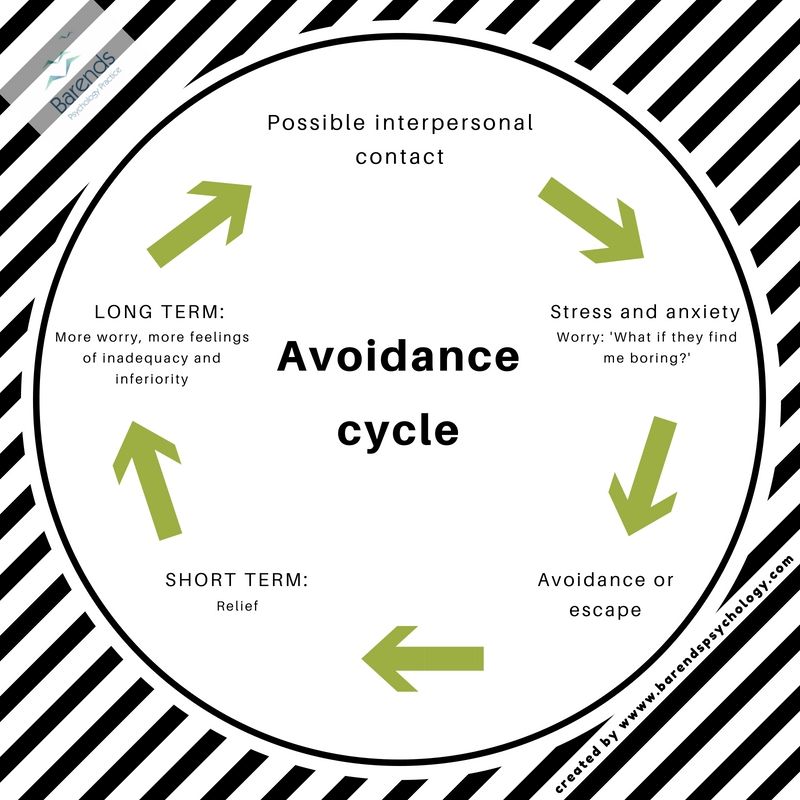 Hang up your jacket in the closet before walking into the living room to sit on the couch. Evaluate your behavioral patterns to develop routines that work for you.
Hang up your jacket in the closet before walking into the living room to sit on the couch. Evaluate your behavioral patterns to develop routines that work for you.
Build routines by developing protocols to tackle regular chores with less effort. To feel less scattered and more accomplished when you go grocery shopping, create a standing list of weekly staples and take a few minutes before you head out the door to add whatever else you may need for the current week to your list.
Routine-Building Tips for Living With ADHD
Building a pattern of repeated behavior takes time and practice. These tips help routine become second nature.
- Follow a mail routine: Make a system to check and sort mail on specific days and times of the week. Designate an area or container to hold important mail like bills, checks and insurance information.
- Create a routine for chores: Schedule regular chores like laundry and dishes at set days and times every week.

- Use electronic notifications and reminders: Use electronic devices, apps and smart technology to your advantage. Make it a habit to set reminders for appointments and meetings the moment you schedule them. Add notifications for routine responsibilities like taking medications or placing trash outside for pickup.
- Make an exercise routine: Fitness increases the availability of dopamine in the brain, which is often at lower levels than usual for people with ADHD. Exercise also reduces anxiety, improves memory, reduces compulsive behavior and improves executive function — the skills used to organize, plan and remember details.
3. Make Big Tasks More Manageable
If you have to complete a long assignment or an overwhelming project that requires multiple steps and great attention to detail, break it down into smaller, more manageable steps that are easier to accomplish.
Use a detailed checklist or write out your task’s separate components to create a step-by-step roadmap that helps you stay on course from start to finish.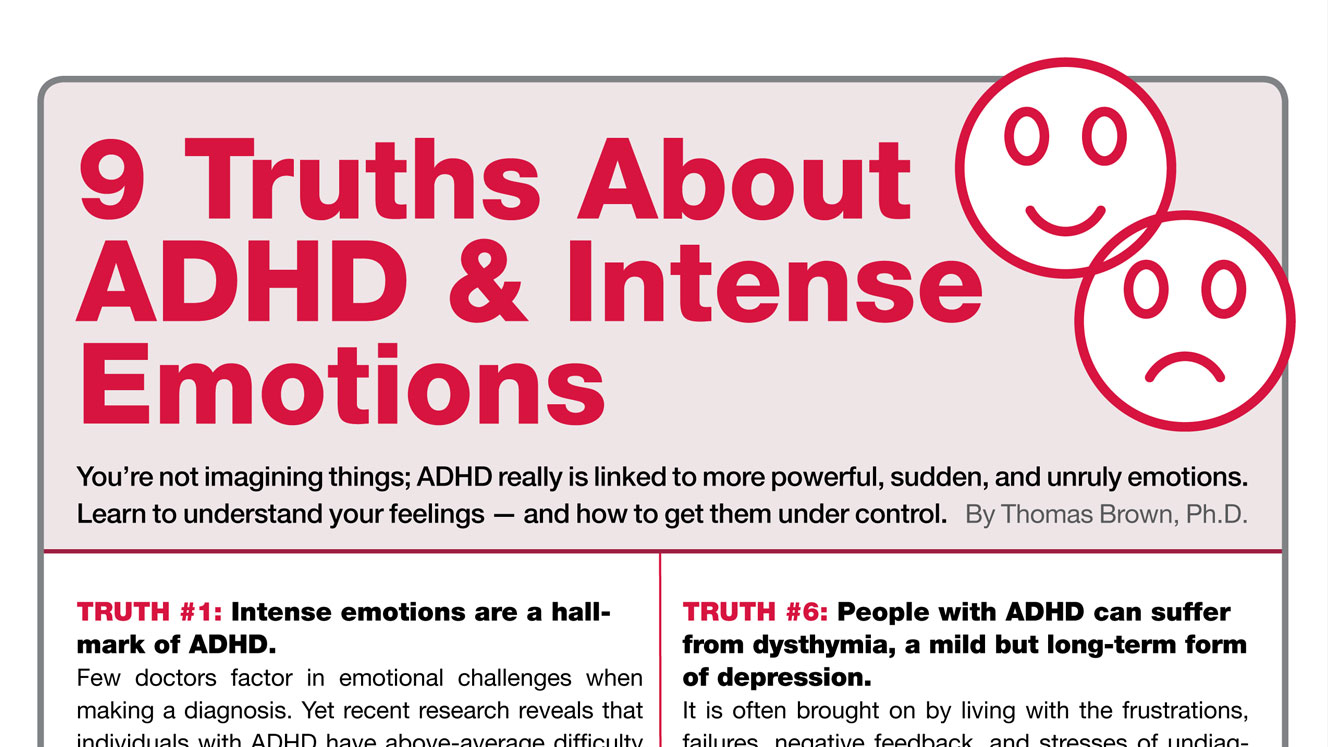 Initially, it’s not necessary to put these actionable items in order or even get them all down on paper. After you’ve gotten started and have some momentum, you can add items and put your list into alphabetical or chronological order.
Initially, it’s not necessary to put these actionable items in order or even get them all down on paper. After you’ve gotten started and have some momentum, you can add items and put your list into alphabetical or chronological order.
Time Management for Adults With ADHD
Organization and routine set the foundation for better time management, but it can feel overwhelming to start a scheduled project. Sometimes you aren’t quite sure how to begin, or the full scope of the duty seems immense. Whenever you experience these mental or physical roadblocks, commit to working for short amounts of time using a timer method.
Break up large projects into smaller tasks. Instead of one big, daunting project to “clean the entire living room,” create separate tasks like this:
- Task #1: Collect dishes from the living room and place them in the kitchen sink.
- Task #2: Remove items that do not belong in the living room and place them in their homes — toys go back to kids’ rooms, shoes go into the closet.
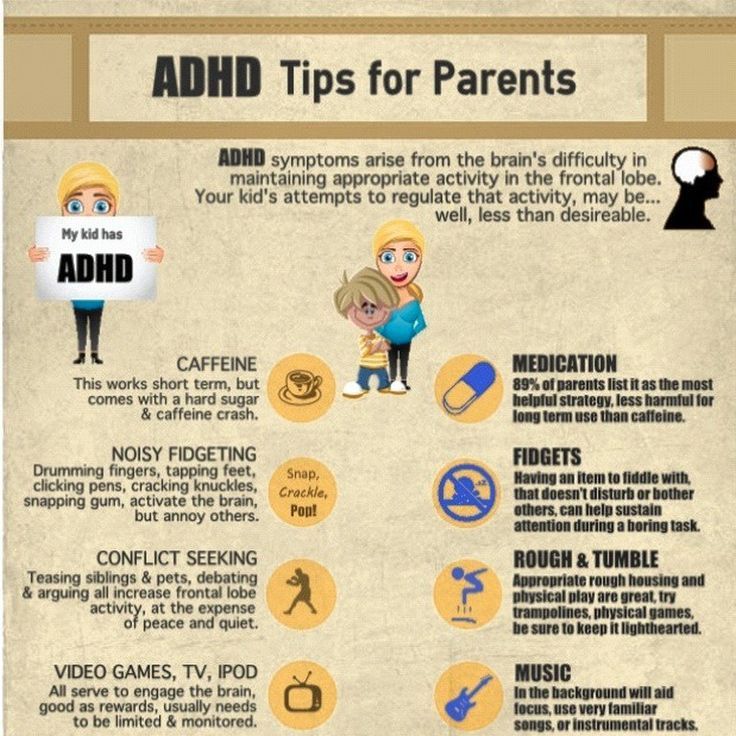
- Task #3: Vacuum the carpet.
- Task #4: Wipe down tables and surfaces with polish or cleaning spray.
The next time you need to start a substantial project, try this exercise:
- Set a timer for 10 to 15 minutes to do only one of the defined tasks.
- For those few minutes, keep your attention focused on that task alone.
- When the timer chimes, decide if you have the energy to continue on that task or, if completed, start a new one for an additional 10 to 15 minutes.
- If you still feel motivated, reset the timer and continue working in short intervals for as long as you can.
- If you’d like to rest, that’s OK — stop the activity and try again later or the following day.
4. Minimize Distractions
When you have personal or professional work that requires a higher level of concentration, minimizing distractions can help you keep your focus for longer stretches of time. Declutter and simplify your surroundings at home to remove distractions and improve focus.
Simplification helps at work, too. Improve your concentration by completing existing projects before starting new ones.
Avoid overscheduling and learn to say no to new tasks or responsibilities. Saying no to unnecessary tasks gives you the time and focus to say yes to crucial ones.
How to Deal With Adult ADHD at Work
What distracts you the most at work? Social media? News alerts? Email? Texts? Your messy desk surface? Noisy co-workers?
Distractions at work are a common challenge for employees with ADHD. Be honest with yourself about what causes your primary distractions and curtail those diversions using these tips.
- Turn off notifications: Route calls to voicemail. If you can, turn off message notifications. Check your messages at set times during the day.
- Use noise-canceling headphones: Headphones are ideal for busy or loud environments.
- Choose a quiet space: Request a quiet office space or cubicle.
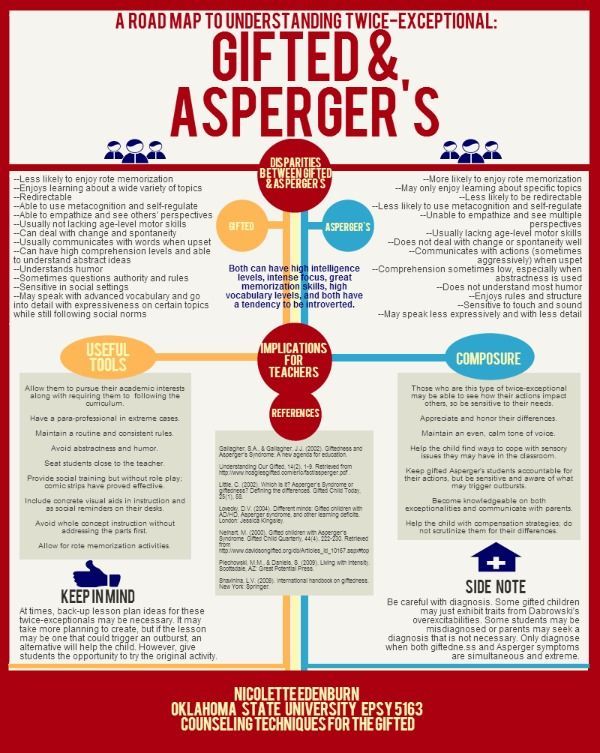
- Listen to music: Play music or a white noise machine. Research shows that music structure helps the ADHD brain stay on a linear path and address timing deficits. However, not all music works the same way. Loud songs with lyrics can have a distracting effect on some adults with ADHD. The best music options for the benefit of concentration are classical composers and soothing instrumentals.
- Adjust your work schedule: Start work earlier in the day or stay later than usual when it’s quieter at the office.
- Maintain a clean desk: Keep your workspace clutter-free to prevent visual distraction.
5. Respect Your Limits
If you start each morning feeling optimistic about how much work or activity you can incorporate into your day, you’re not alone. Many people overextend themselves by taking on more tasks than they can handle or underestimating the amount of time they need to get things done.
Nothing creates more pressure than committing yourself beyond your limits day after day. Failing to deliver on your promises, whether you’ve made them to your boss, family, friends or yourself, can take the wind out of your sails and leave you feeling even more scattered than usual.
Failing to deliver on your promises, whether you’ve made them to your boss, family, friends or yourself, can take the wind out of your sails and leave you feeling even more scattered than usual.
Learning how to live with ADHD involves recognizing when you’ve reached your limit and need to remove tasks from your plate. When you take time to understand and respect your limits, you empower yourself to commit to less and deliver more often.
Professional Help for ADHD Management for Adults
Here at Advanced Psychiatry Associates, we know that ADHD is a complex disorder that affects each adult uniquely. If you’d like some guidance to find the strategies and solutions that fit your life, our experienced, compassionate team is ready to help.
We understand how to deal with ADHD in adults and have dedicated our time and training to providing comprehensive care for our patients. Advanced Psychiatry Associates offers the largest full-service facility in the Sacramento region and provides medication management, therapy and counseling, transcranial magnetic stimulation, ketamine treatments and lab services all in one place for your convenience. Call our office in Folsom, Calif., or schedule an appointment online today.
Call our office in Folsom, Calif., or schedule an appointment online today.
Tips for Managing Adult ADHD
adhd
Attention deficit hyperactivity disorder can create problems in all areas of your life. But these tips can help you cope with symptoms, get focused, and turn chaos into calm.
How to deal with Adult ADHD (or ADD)
If you have attention deficit hyperactivity disorder (ADHD), previously known as ADD, everything from paying the bills on time to keeping up with work, family, and social demands can seem overwhelming. ADHD can present challenges for adults across all areas of life and can be tough on your health and both your personal and on-the-job relationships. Your symptoms may lead to extreme procrastination, trouble meeting deadlines, and impulsive behavior. In addition, you may feel that friends and family don’t understand what you’re up against.
Fortunately, there are skills you can learn to help control your symptoms of ADHD.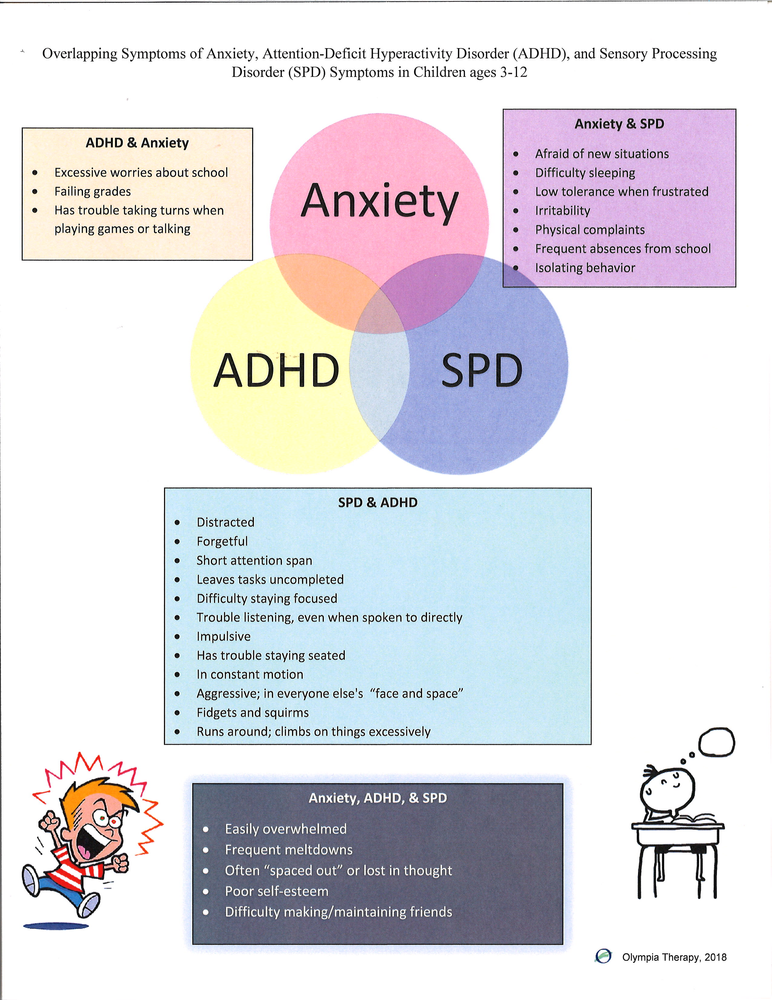 You can improve your daily habits, learn to recognize and use your strengths, and develop techniques that help you work more efficiently, maintain organization, and interact better with others. Part of helping yourself may also include educating others to help them understand what you’re going through.
You can improve your daily habits, learn to recognize and use your strengths, and develop techniques that help you work more efficiently, maintain organization, and interact better with others. Part of helping yourself may also include educating others to help them understand what you’re going through.
Change won’t happen overnight, though. These ADHD self-help strategies require practice, patience, and, perhaps most importantly, a positive attitude. But by taking advantage of these techniques, you can become more productive, organized, and in control of your life—and improve your sense of self-worth.
| Adult ADHD self-help myths |
| Myth: Medication is the only way to solve my ADHD. Fact: While medication can help some people manage the symptoms of ADHD, it is not a cure, nor is it the only solution. If taken at all, it should be used in conjunction with other treatments or self-help strategies. |
| Myth: Having ADHD means I'm lazy or unintelligent, so I won't be able to help myself. Fact: The effects of ADHD may have caused you and others to label you this way, but the truth is that you are not unmotivated or unintelligent—you have a disorder that gets in the way of certain normal functions. In fact, adults with ADHD often have to find very smart ways to compensate for their disorder. |
| Myth: A health professional can solve all my ADHD problems. Fact: Health professionals can help you manage symptoms of ADHD, but they can only do so much. You're the one living with the problems, so you're the one who can make the most difference in overcoming them. |
| Myth: ADHD is a life sentence—I'll always suffer from its symptoms. Fact: While it's true that there is no cure for ADHD, there is a lot you can do to reduce the problems it can cause. |
With over 25,000 licensed counselors, BetterHelp has a therapist that fits your needs. Sign up today and get matched.
GET 20% OFF
Tips for getting organized and controlling clutter
The hallmark traits of ADHD are inattention and distractibility—making organization perhaps the biggest challenge adults with the disorder face. If you have ADHD, the prospect of getting organized, whether it be at work or home, may leave you feeling overwhelmed.
However, you can learn to break tasks down into smaller steps and follow a systematic approach to organization. By implementing various structures and routines, and taking advantage of tools such as daily planners and reminders, you can set yourself up to maintain organization and control clutter.
Develop structure and neat habits—and keep them up
To organize a room, home, or office, start by categorizing your objects, deciding which are necessary and which can be stored or discarded. To organize yourself, get in the habit of taking notes and writing lists. Maintain your newly organized structure with regular, daily routines.
To organize yourself, get in the habit of taking notes and writing lists. Maintain your newly organized structure with regular, daily routines.
Create space. Ask yourself what you need on a daily basis, and find storage bins or closets for things you don't. Designate specific areas for things like keys, bills, and other items that can be easily misplaced. Throw away things you don't need.
Use a calendar app or day planner. Effective use of a day planner or a calendar on your smartphone or computer can help you remember appointments and deadlines. With electronic calendars, you can also set up automatic reminders so scheduled events don't slip your mind.
Use lists. Make use of lists and notes to keep track of regularly scheduled tasks, projects, deadlines, and appointments. If you decide to use a daily planner, keep all lists and notes inside it. You also have many options for use on your smartphone or computer. Search for “to do” apps or task managers.
Deal with it now. You can avoid forgetfulness, clutter, and procrastination by filing papers, cleaning up messes, or returning phone calls immediately, not sometime in the future. If a task can be done in two minutes or less, do it on the spot, rather than putting it off for later.
Tame your paper trail
If you have ADHD, paperwork might make up a major part of your disorganization. But you can put a stop to the endless piles of mail and papers strewn across your kitchen, desk, or office. All it takes is some time to set up a paperwork system that works for you.
Deal with mail on a daily basis. Set aside a few minutes each day to deal with the mail, preferably as soon as you bring it inside. It helps to have a designated spot where you can sort the mail and either trash it, file it, or act on it.
Go paperless. Minimize the amount of paper you have to deal with. Request electronic statements and bills instead of paper copies. In the U.S., you can reduce junk mail by opting out of the Direct Marketing Association's (DMA) Mail Preference Service.
In the U.S., you can reduce junk mail by opting out of the Direct Marketing Association's (DMA) Mail Preference Service.
Set up a filing system. Use dividers or separate file folders for different types of documents (such as medical records, receipts, and income statements). Label and color-code your files so that you can find what you need quickly.
Tips for managing your time and staying on schedule
Trouble with time management is a common effect of ADHD. You may frequently lose track of time, miss deadlines, procrastinate, underestimate how much time you need for tasks, or find yourself doing things in the wrong order. Many adults with ADHD spend so much time on one task—known as “hyperfocusing”—that nothing else gets done. These difficulties can leave you feeling frustrated and inept, and make others impatient. But, there are solutions to help you better manage your time.
Time management tips
Adults with attention deficit disorder often have a different perception of how time passes.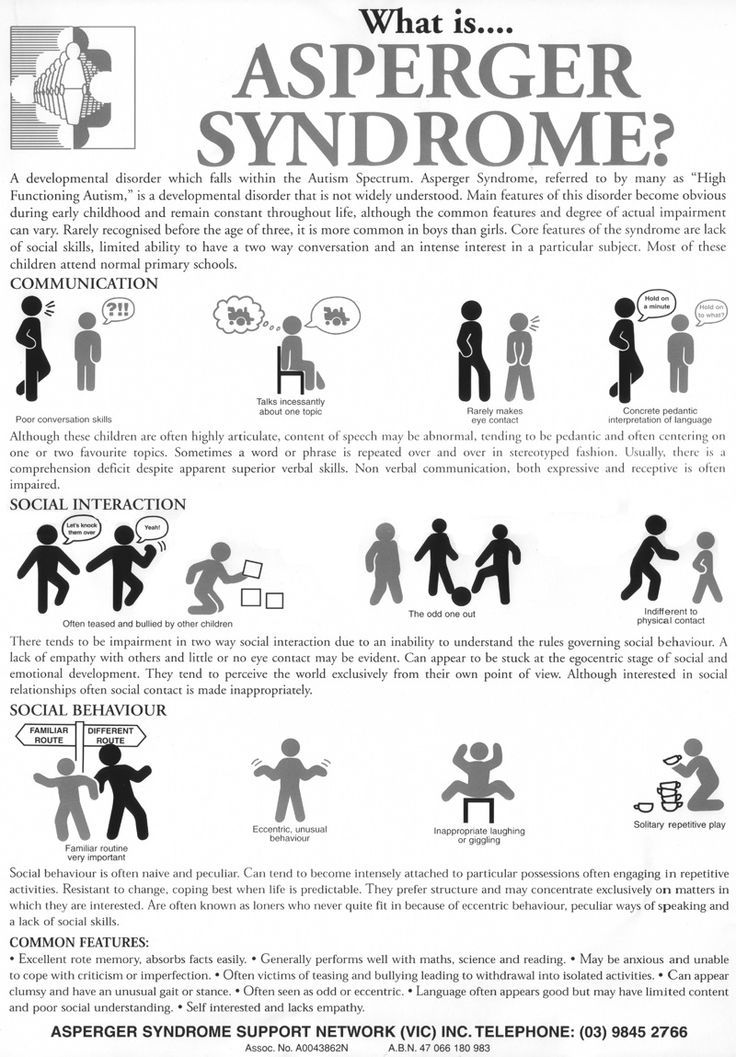 To align your sense of time with everyone else, use the oldest trick in the book: a clock.
To align your sense of time with everyone else, use the oldest trick in the book: a clock.
Become a clock-watcher. Use a wristwatch or highly visible wall or desk clock to help you keep track of time. When you start a task, make a note of the time by saying it out loud or writing it down.
Use timers. Allot yourself limited amounts of time for each task and use a timer or alarm to alert you when your time is up. For longer tasks, consider setting an alarm to go off at regular intervals to keep you productive and aware of how much time is going by.
Give yourself more time than you think you need. Adults with ADHD are notoriously bad at estimating how long it will take to do something. For every thirty minutes of time you think it will take you to get someplace or complete a task, give yourself a cushion by adding ten minutes.
Plan to be early and set up reminders. Write down appointments for fifteen minutes earlier than they really are. Set up reminders to ensure you leave on time and make sure you have everything you need ahead of time so you're not frantically looking for your keys or phone when it's time to go.
Set up reminders to ensure you leave on time and make sure you have everything you need ahead of time so you're not frantically looking for your keys or phone when it's time to go.
Prioritization tips
Because adults with ADHD often struggle with impulse control and jump from one subject to another, completing tasks can be difficult and large projects can seem overwhelming. To overcome this:
Decide what to tackle first. Ask yourself what the most important task is that you need to accomplish, and then order your other priorities after that one.
Take things one at a time. Break down large projects or jobs into smaller, manageable steps.
Stay on task. Avoid getting sidetracked by sticking to your schedule, using a timer to enforce it if necessary.
Learn to say no
Impulsiveness can lead adults with ADHD to agree to too many projects at work or make too many social engagements. But a jam-packed schedule can leave you feeling overwhelmed, overtired, and affect the quality of your work.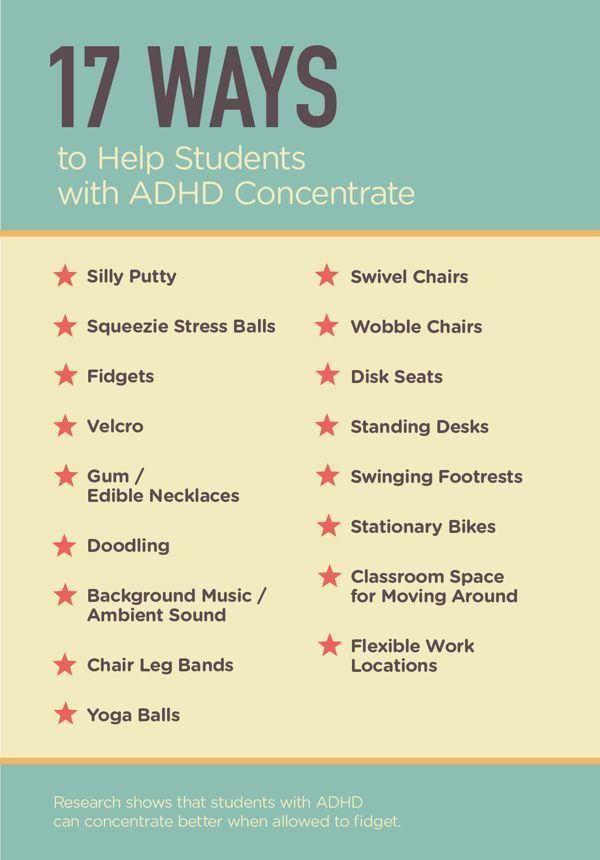 Saying no to certain commitments may improve your ability to accomplish tasks, keep social dates, and live a healthier lifestyle. Check your schedule first before agreeing to something new.
Saying no to certain commitments may improve your ability to accomplish tasks, keep social dates, and live a healthier lifestyle. Check your schedule first before agreeing to something new.
Advertisement
40 Days to Positive Change
Learn how to fully embrace the change process and create a positive new habit in your life. Join Kelly McGonigal for a free video from Sounds True and initiate the transformation you need most.
WATCH THE FREE VIDEO
Tips for managing money and bills
Money management requires budgeting, planning, and organization, so for many adults with ADHD, it can pose a true challenge. Many common systems of money management don't tend to work for adults with ADHD because they require too much time, paper, and attention to detail. But if you create your own system that is both simple and consistent, you can get on top of your finances and put a stop to overspending, overdue bills, and penalties for missed deadlines.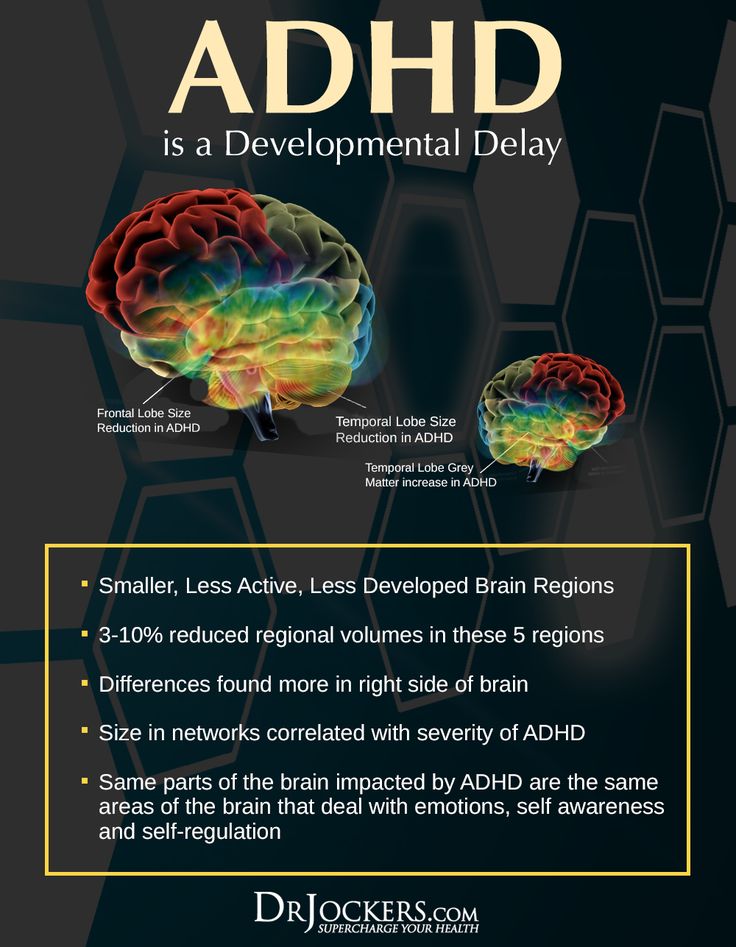
Control your budget
An honest assessment of your financial situation is the first step to getting budgeting under control. Start by keeping track of every expense, no matter how small, for a month. This will allow you to effectively analyze where your money is going. You may be surprised at how much you're spending on unnecessary items and impulse purchases. You can then use this snapshot of your spending habits to create a monthly budget based on your income and needs.
Figure out how you can avoid straying from your budget. For example, if you're spending too much at restaurants, you can make an eating-in plan and factor in time for grocery shopping and meal preparation.
Set up a simple money management and bill paying system
Establish an easy, organized system that helps you save documents, receipts, and stay on top of bills. For an adult with ADHD, the opportunity to manage banking on the computer can be the gift that keeps on giving. Organizing money online means less paperwork, no messy handwriting, and no misplaced slips.
Switch to online banking. Signing up for online banking can turn the hit-or-miss process of balancing your budget into a thing of the past. Your online account will list all deposits and payments, tracking your balance automatically, to the penny, every day. You can also set up automatic payments for your regular monthly bills and log on as needed to pay irregular and occasional ones. The best part: no misplaced envelopes or late fees.
Set up bill pay reminders. If you prefer not to set up automatic payments, you can still make the process of bill paying easier with electronic reminders. You may be able to set up text or email reminders through online banking or you can schedule them in your calendar app.
Take advantage of technology. Free services can help you keep track of your finances and accounts. They typically take some time to set up, but once you've linked your accounts they automatically update. Such tools can make your financial life easier.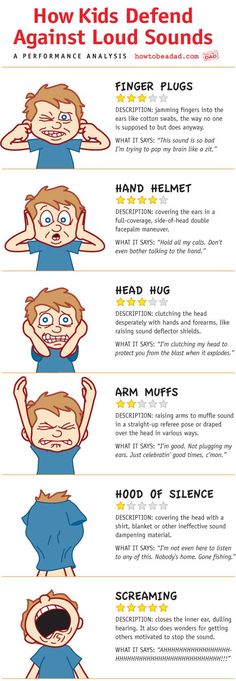
Put a stop to impulse shopping
Impulsivity from ADHD and shopping can be a very dangerous combination. It can put you in debt and make you feel guilty and ashamed. You can prevent impulsive buys with a few strategic tactics.
- Shop with cash only—leave your checkbook and credit cards at home.
- Cut up all but one credit card. When you shop, make a list of what you need and stick to it.
- Use a calculator to keep a running total when shopping (hint: there's one on your mobile phone).
- Stay away from places where you're likely to spend too much money, throw away catalogs as they arrive, and block emails from retailers.
Tips for staying focused and productive at work
ADHD can create special challenges at work. The things you may find toughest—organization, completion of tasks, sitting still, listening quietly—are the very things you're often asked to do all day long.
Juggling ADHD and a challenging job is no easy task, but by tailoring your workplace environment you can take advantage of your strong points while minimizing the negative impact of your ADHD symptoms.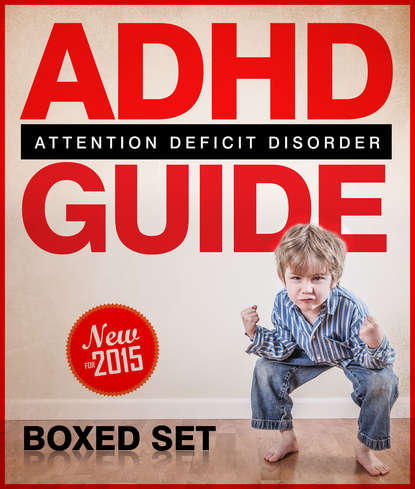
Get organized at work
Organize your office, cubicle, or desk, one manageable step at a time. Then use the following strategies to stay tidy and organized:
Set aside daily time for organization. Mess is always distracting so set aside 5 to 10 minutes a day to clear your desk and organize your paperwork. Experiment with storing things inside your desk or in bins so that they don't clutter your workspace as unnecessary distractions.
Use colors and lists. Color-coding can be very useful to people with ADHD. Manage forgetfulness by writing everything down.
Prioritize. More important tasks should be placed first on your to-do list so you remember to do them before lower priority tasks. Set deadlines for everything, even if they are self-imposed.
End distractions
When you have attention issues, where you work and what is around you can significantly affect how much you are able to get done. Let your workmates know you need to concentrate, and try the following techniques to minimize distractions:
Where you work matters.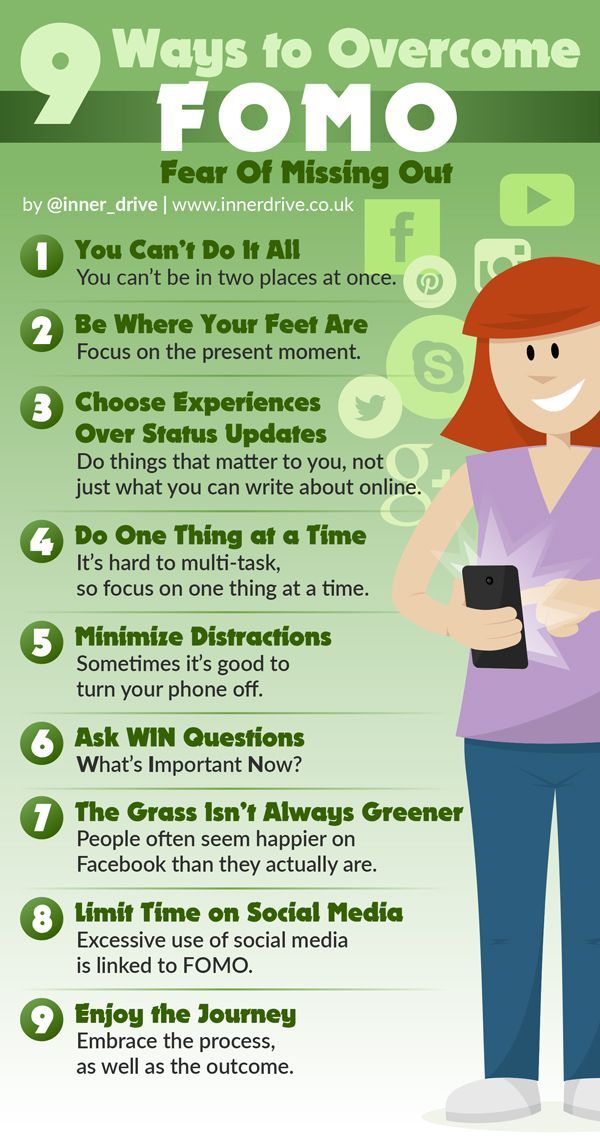 If you don't have your own office, you may be able to take your work to an empty office or conference room. If you are in a lecture hall or conference, try sitting close to the speaker and away from people who chat during the meeting.
If you don't have your own office, you may be able to take your work to an empty office or conference room. If you are in a lecture hall or conference, try sitting close to the speaker and away from people who chat during the meeting.
Minimize external commotion. Face your desk towards a wall and keep your workplace free of clutter. To discourage interruptions, you could even hang a “Do Not Disturb” sign. If possible, let voicemail pick up your phone calls and return them later, turn off email and social media during certain times of the day, or even log off the Internet completely. If noise distracts you, consider noise-canceling headphones or a sound machine
Save big ideas for later. All those great concepts or random thoughts that keep popping into your head and distracting you? Jot them down on paper or on your smartphone for later consideration. Some people with ADHD like to schedule time at the end of the day to go through all the notes they've made.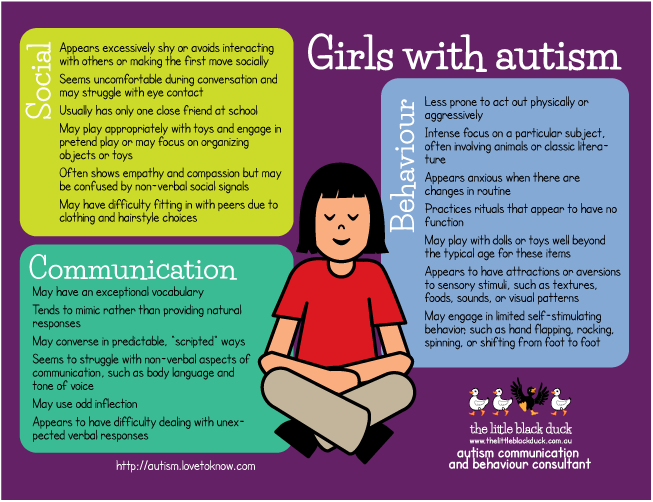
Stretch your attention span
As an adult with ADHD, you are capable of focusing—it's just that you may have a hard time keeping that focus, especially when the activity isn't one that you find particularly engaging. Boring meetings or lectures are hard on anyone, but for adults with ADHD, they may pose a special challenge. Similarly, following multiple directions can also be difficult for those with ADHD. Use these tips to improve your focus and ability to follow instructions:
Get it in writing. If you're attending a meeting, lecture, workshop, or another gathering that requires close attention, ask for an advance copy of the relevant materials—such as a meeting agenda or lecture outline. At the meeting, use the written notes to guide your active listening and note taking. Writing as you listen will help you stay focused on the speaker's words.
Echo directions. After someone gives verbal instructions, say them aloud to make sure you got it right.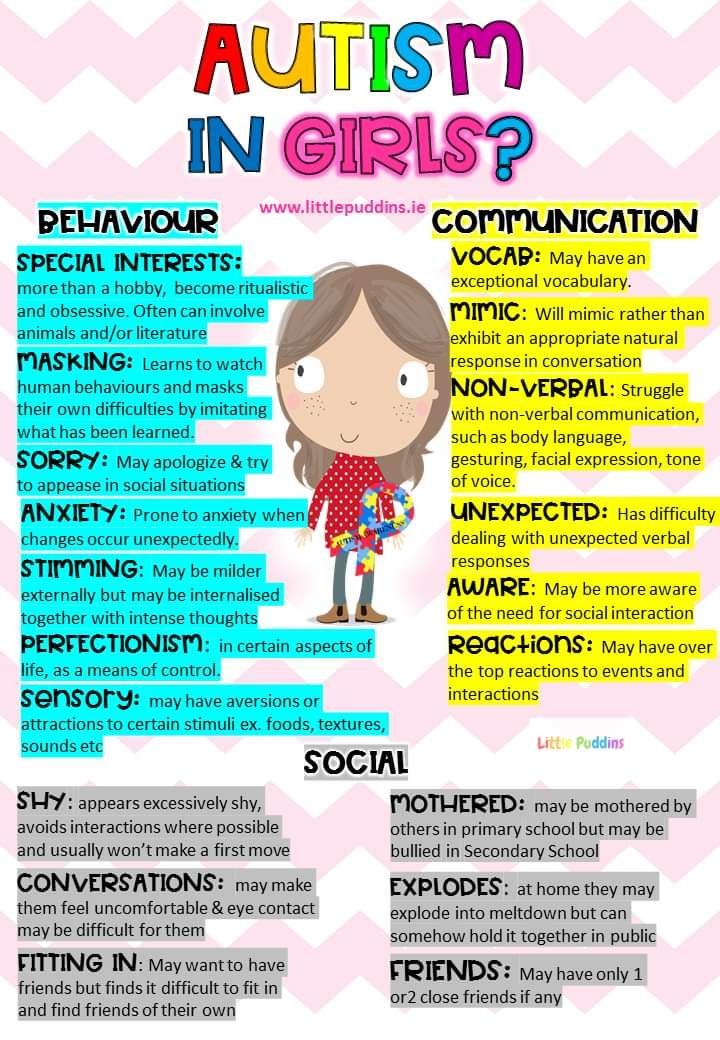
Move around. To prevent restlessness and fidgeting, go ahead and move around—at the appropriate times in the right places. As long as you are not disturbing others, try squeezing a stress ball during a meeting, for example. Or taking a walk or even jumping up and down during a meeting break can help you pay attention later on.
ADVERTISEMENT
Tips for managing stress and boosting mood
Due to the impulsivity and disorganization that often accompany ADHD, you may struggle with erratic sleep, an unhealthy diet, or the effects of too little exercise—all issues that can lead to extra stress, bad moods, and feeling out of control. The best way to stop this cycle is to take charge of your lifestyle habits and create healthy new routines.
Eating well, getting plenty of sleep, and exercising regularly can help you stay calm, minimize mood swings, and fight any symptoms of anxiety and depression. Healthier habits can also reduce ADHD symptoms like inattention, hyperactivity, and distractibility, while regular routines can help your life feel more manageable.
Exercise and spend time outdoors
Working out is perhaps the most positive and efficient way to reduce hyperactivity and inattention from ADHD. Exercise can relieve stress, boost your mood, and calm your mind, helping work off the excess energy and aggression that can get in the way of relationships and feeling stable.
Exercise on a daily basis. Choose something vigorous and fun that you can stick with, like a team sport or working out with a friend.
Increase stress relief by exercising outdoors—people with ADHD often benefit from sunshine and green surroundings.
Try relaxing forms of exercise, such as mindful walking, yoga, or tai chi. In addition to relieving stress, they can teach you to better control your attention and impulses.
Get plenty of sleep
Sleep deprivation can increase symptoms of adult ADHD, reducing your ability to cope with stress and maintain focus during the day. Simple changes to daytime habits go a long way toward ensuring solid nightly sleep.
- Avoid caffeine late in the day.
- Exercise vigorously and regularly, but not within an hour of bedtime.
- Create a predictable and quiet “bedtime” routine, including taking a hot shower or bath just before bed.
- Stick to a regular sleep-wake schedule, even on weekends.
Eat healthfully
While unhealthy eating habits don't cause ADHD, a poor diet can exacerbate symptoms. By making simple changes in what and how you eat, you may experience big reductions in distractibility, hyperactivity, and stress levels.
- Eat small meals throughout day.
- Avoid sugar and junk food as much as possible.
- Make sure you include healthy protein at every meal.
- Aim for several servings of fiber-rich whole grains each day.
Practice mindfulness
As well as reducing stress, regular mindfulness meditation can help you to better resist distractions, lower impulsivity, improve your focus, and provide more control over your emotions. Since hyperactivity symptoms can make meditation a challenge for some adults with ADHD, starting slowly can help. Meditate for short periods and gradually increase your meditation time as you become more comfortable with the process—and are better able to maintain focus. The key is to then draw on these mindfulness techniques during your daily life to keep you on track. Experiment with free or inexpensive smartphone apps or online guided meditations.
Since hyperactivity symptoms can make meditation a challenge for some adults with ADHD, starting slowly can help. Meditate for short periods and gradually increase your meditation time as you become more comfortable with the process—and are better able to maintain focus. The key is to then draw on these mindfulness techniques during your daily life to keep you on track. Experiment with free or inexpensive smartphone apps or online guided meditations.
Authors: Robert Segal, M.A. and Melinda Smith, M.A.
- References
Neurodevelopmental Disorders. (2013). In Diagnostic and Statistical Manual of Mental Disorders. American Psychiatric Association. https://doi.org/10.1176/appi.books.
 9780890425787.x01_Neurodevelopmental_Disorders
9780890425787.x01_Neurodevelopmental_DisordersCanela, C., Buadze, A., Dube, A., Eich, D., & Liebrenz, M. (2017). Skills and compensation strategies in adult ADHD – A qualitative study. PLoS ONE, 12(9), e0184964. https://doi.org/10.1371/journal.pone.0184964
Mitchell, J. T., McIntyre, E. M., English, J. S., Dennis, M. F., Beckham, J. C., & Kollins, S. H. (2017). A Pilot Trial of Mindfulness Meditation Training for Attention-Deficit/Hyperactivity Disorder in Adulthood: Impact on Core Symptoms, Executive Functioning, and Emotion Dysregulation. Journal of Attention Disorders, 21(13), 1105–1120. https://doi.org/10.1177/1087054713513328
Seven Daily Habits to Close the “Success Gap” – How to uncover your special talents and use them to achieve important goals. (ADDitude)
Adult ADHD: Free Downloads – Download free tip-filled handouts about managing adult ADHD. Includes information on getting organized, bringing bills under control, and staying focused.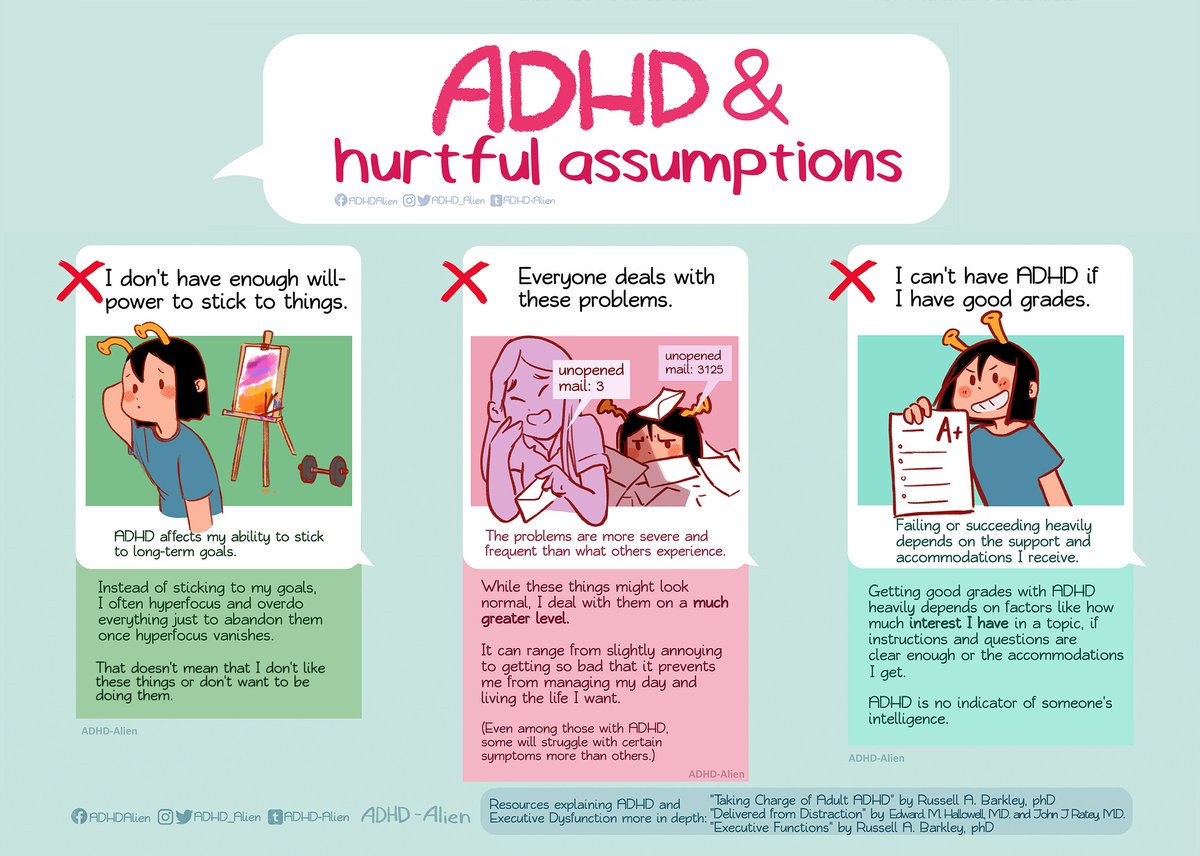 (ADDitude)
(ADDitude)
Relationships & Social Skills – Challenges associated with ADHD and concrete tips on implementing change (CHADD)
Managing Money and ADHD – Improve your money management skills, follow a budget, and stay on top of bills. (CHADD)
Top Ten ADHD Traps in the Workplace – Covers the top workplace stumbling blocks for people with ADHD, and strategies for avoiding them. (Healthy Place)
Workplace Accommodations Can Make You and Your Employer Successful – How to adapt your work environment to the challenges of ADHD. (CHADD)
Last updated: November 15, 2022
How to Stay Productive with Attention Deficit Hyperactivity Disorder
January 13, 2020 Productivity
Personal experience of a woman who built a successful career, despite the tendency to procrastinate and forget everything in the world.
Share
0 Attention deficit hyperactivity disorder (ADHD) is a neurological disorder that makes it very difficult for people to focus on anything for long periods of time.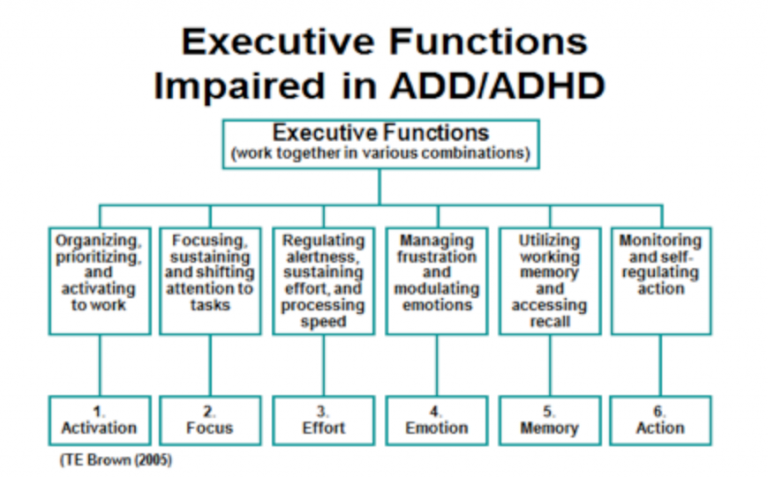 According to statistics, 4.4% of the total adult population suffers from this disorder. People with this syndrome experience problems with employment, education, more often abuse alcohol and get into traffic accidents.
According to statistics, 4.4% of the total adult population suffers from this disorder. People with this syndrome experience problems with employment, education, more often abuse alcohol and get into traffic accidents.
However, ADHD is not a death sentence. Some manage to adapt to it. For example, Sasha Kollekat.
Sasha Collecutt
Blogger, training specialist at Fusion Sport.
The diagnosis of ADHD has had a profound effect on my career. I have lived my whole life in the sincere belief that meeting a deadline is like reaching for the clouds in the sky. That choosing clothes before going to work can take all morning. And that criticism must necessarily be discouraging and frustrating.
I understood that my career experience was not normal. And this understanding helped me: I was able to adapt.
I am now 33 years old and have a job that I love and excel at. Each new day brings me interesting tasks that I can foresee, evaluate and solve in a timely manner.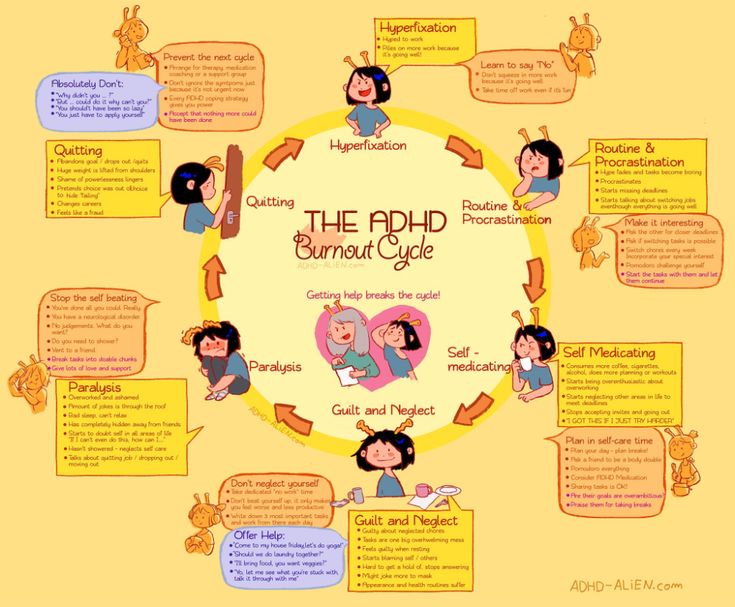 Many of my colleagues believe that I am a very responsible and organized person (which surprises me myself).
Many of my colleagues believe that I am a very responsible and organized person (which surprises me myself).
Various productivity tips and techniques that are good for other people are usually not effective for me. And so, in order to keep my job and achieve career growth, I set myself the task of finding a system that would help me. ADHD usually has a specific effect on executive functions. In my case, the following abilities were affected:
- Working memory - that is, the ability to retain information in the head for a short period of time. Problems with this characteristic at work make it very difficult to return to your assignment after you have been interrupted or distracted. For the same reason, people with ADHD find it difficult to follow complex instructions.
- Emotional self-regulation — the ability to correctly build one's behavior depending on the current situation. If you do not have well-developed emotional regulation skills, you will react painfully to criticism and miss out on career opportunities.
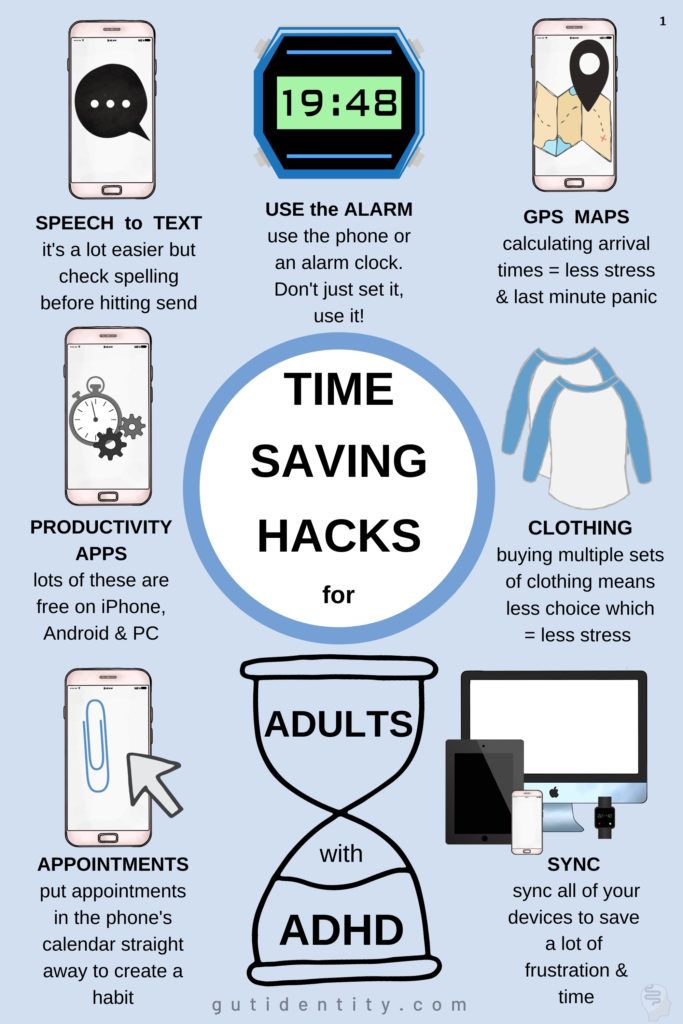
- Self-motivation - the ability to act in accordance with one's desires. Even if you want to improve your life, keeping promises to yourself can be very difficult. And if you do not cope, it will entail sad career and financial consequences.
- Planning - the ability to foresee the future, reasonably estimate time and predict the results of events. Meeting deadlines, being punctual in meetings, and determining the resources needed for a given task are important in any job. But people with ADHD have a hard time even just thinking about time - this strange, often unrecognized symptom has been studied by specialists from Umeå University in Sweden.
Procrastination and forgetfulness, the eternal companions of attention deficit hyperactivity disorder, constantly haunted me at work. They just ruined my career, causing a lot of stress and frustration. And I set myself the goal of dealing with them.
How to deal with procrastination
Constant painful procrastination is one of the main signs of ADHD in adults. This is a real spiritual torture - depressing, exhausting and ... voluntary. And to defeat her, you must make your own choice. I am want to be in the office on time, complete projects on time, be successful and be a great training manager. I don't want to be a bad or at least an average worker.
This is a real spiritual torture - depressing, exhausting and ... voluntary. And to defeat her, you must make your own choice. I am want to be in the office on time, complete projects on time, be successful and be a great training manager. I don't want to be a bad or at least an average worker.
I believe that procrastination is just a symptom of my disease.
It's like realizing that you're just not prepared for climbing. Yes, it's a problem (let's not pretend ADHD is all about rainbows and unicorns). But this is a problem that can be dealt with.
Don't think about other people's expectations
I am very careful about the things I've been assigned. Instead of thinking that I should do this or that because it is a colleague or client needs , I pull myself together and say to myself: I want to do this because I believe that my tasks are important for I'm . I try to fit my tasks into my own plan for the future and not perceive them as being imposed on me.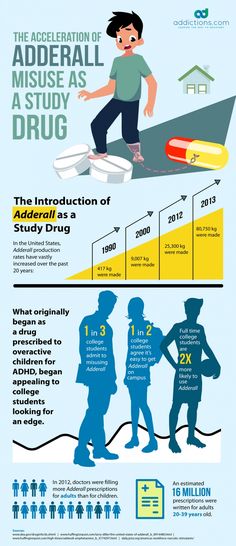
When I think I must do something because others expect me to do it, I run the risk of becoming indifferent to it. And it allows the procrastination monster to take over my mind. Therefore, I think of the company's projects as my own initiatives, work schedules as my personal schedule, and so on. I am always looking for ways to motivate myself personally.
Look at the problem differently
If you can't bring yourself to do something, try a more interesting problem. Do not quit what you started and switch to something completely different, no. Just look at the problem from a different angle.
For example, if you are tired of writing the same e-mails with answers to the same questions of colleagues, write a detailed guide and send them a link to it. Instead of tediously entering data manually using the same template, learn the basics of programming and automate the routine.
Delegate low priority projects to subordinates or interns. Ask for help from colleagues.
Most importantly, avoid procrastination.
Do something you haven't done before
Procrastination is a merciless beast, but it doesn't adapt well to sudden changes. Take advantage of this. Not working in the office - try doing it in the library, cafe or park with a laptop. Do you usually work in silence? Turn on the music this time.
Buy a new perfume. Eat something unusual for lunch. Rearrange your table. Write with a non-dominant hand. Install another text editor. Change the hours you work. In general, introduce some novelty into the routine, and procrastination will recede. At least for a while.
Fool your procrastination
Sounds silly, but it works. For example, if I can’t get ready for work in the morning, I say to myself: “I’m not going anywhere yet, I’m just packing my things.” Then: “I don’t get into the car yet, but just enjoy the weather outside.” And then, having come to work: “I haven’t sat down at the table yet, I just drink coffee.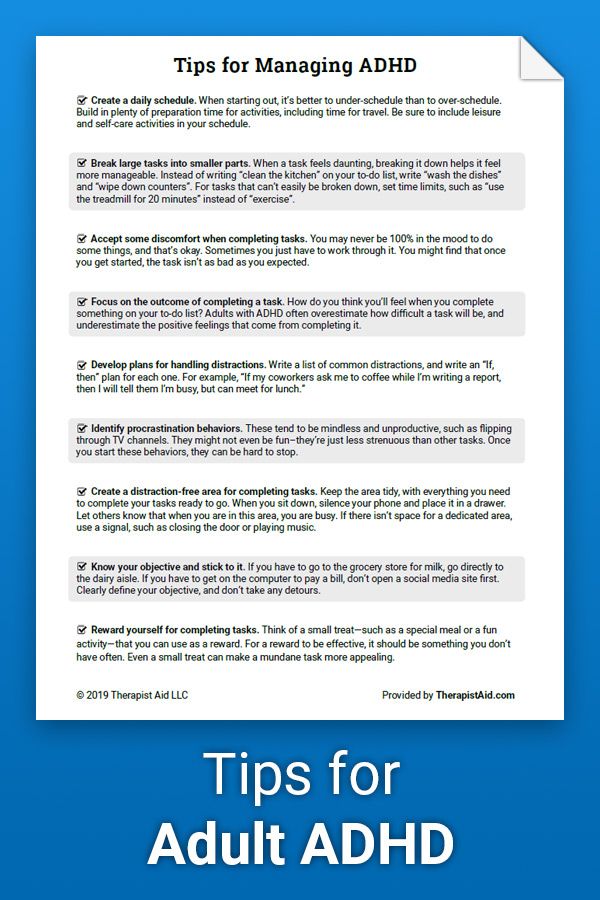 ”
”
And finally, starting the tasks: "I'm not working yet, I'm just sketching out a plan." And by the time the procrastination monster realizes what's going on, I'm already fully immersed in the work process and redoing a bunch of things.
Praise yourself for accomplishments
Finishing important work at 3 am because you have been putting it off for a long time is very unpleasant. You would probably be glad that the deed is done, but, most likely, you will still be angry with yourself that you have been pulling the cat by the tail for so long.
Anger is a bad weapon against procrastination, while contentment and self-pride, on the contrary, help a lot.
Therefore, do not forget to praise yourself for the seemingly smallest victories.
I enjoy going through my to-do list and having fun checking off completed items. Opening the inbox of your email and finding that all emails have been answered - what could be more beautiful? And watching the company thrive because of my efforts is very motivating.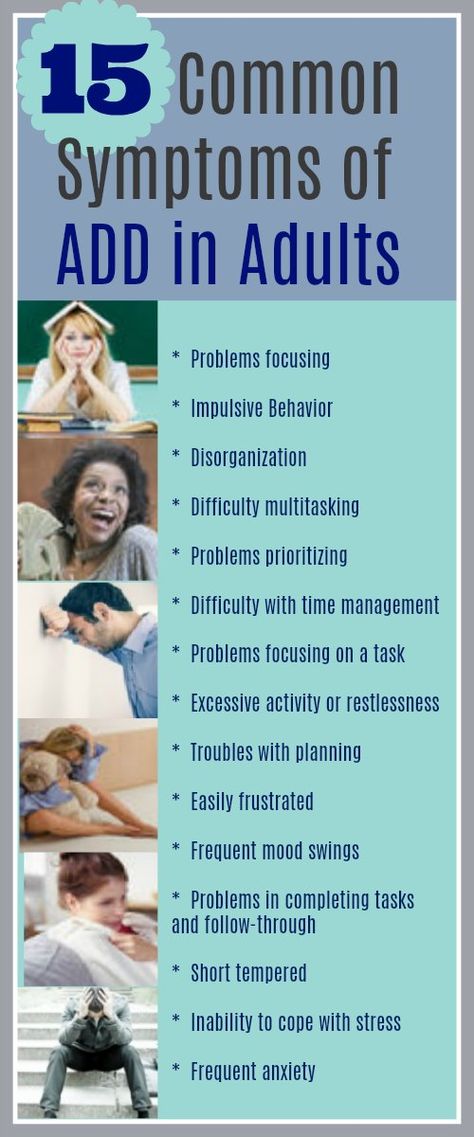 And for self-esteem.
And for self-esteem.
Understand the very nature of procrastination
This will help you be a little more tolerant of yourself as you try to curb it. Procrastination is a kind of attempt to restore your mood. This monster is trying to convince you that the pleasure of doing nothing in the short term outweighs all the problems that you will face later as a result of your inactivity.
How to deal with forgetfulness
Forgetfulness is extremely common among people with ADHD. In fact, this is the most common symptom of this disorder. I was very embarrassed because of my bad memory and was constantly criticized and even scorned by others.
I keep forgetting little things. For example, I can suddenly forget what I did yesterday. Or who are my favorite writers. I forget to make regular backups, perform scheduled tasks, and come to appointments and meetings, even if they repeat weekly at the same time.
Dealing with ADHD is hard work, and dealing with forgetfulness requires a lot of effort. Don't waste your resources trying to deal with your weak memory. Focus on acquiring permanent knowledge.
Don't waste your resources trying to deal with your weak memory. Focus on acquiring permanent knowledge.
Observe
Saying "focus your attention" in an article about ADHD is silly, so I won't tell you that. Observation is much more than just attention.
It requires openness, curiosity, interest and focus on your feelings.
Curiosity is good for people with ADHD. The main thing is that when you observe, do it with the firm intention of understanding and repeating the actions you see yourself.
Read
I read a lot. This is the most efficient way to learn. The more I read, the better I learn. I am not picky in this matter. I read news in the RSS manager, newsletters, media, open access magazines and new books. I borrow, buy and even restore many titles.
Take the time to reread books and absorb, summarize, test, and apply the knowledge you gain through reading. Knowledge is of no use if you do not put it into practice.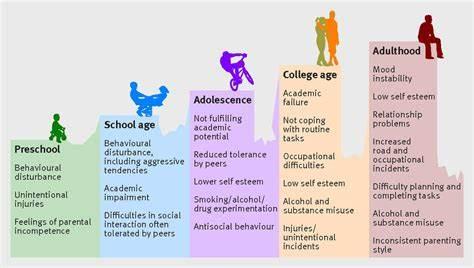
Write to
Even the process of writing this article is helping me fight forgetfulness from ADHD. Just like reading an article helps you.
Packing what you know into logical and understandable text is difficult, but doing so reinforces your knowledge.
No wonder students take notes. If you can write by hand instead of typing, even better. As with reading, take the time to reread and rethink what you write down—days, weeks, months, or even years later.
Teach others
Can you explain something of which you are competent to an inexperienced beginner? The ability to share your knowledge is a true sign of professionalism. I teach others to test how deep my knowledge is. This is for me something like a test of my own abilities - how quickly can I pull up a beginner to my personal level.
Enjoy your own learning
Like most people with ADHD, I have an inexorable drive for novelty and surprise. And it's good for learning.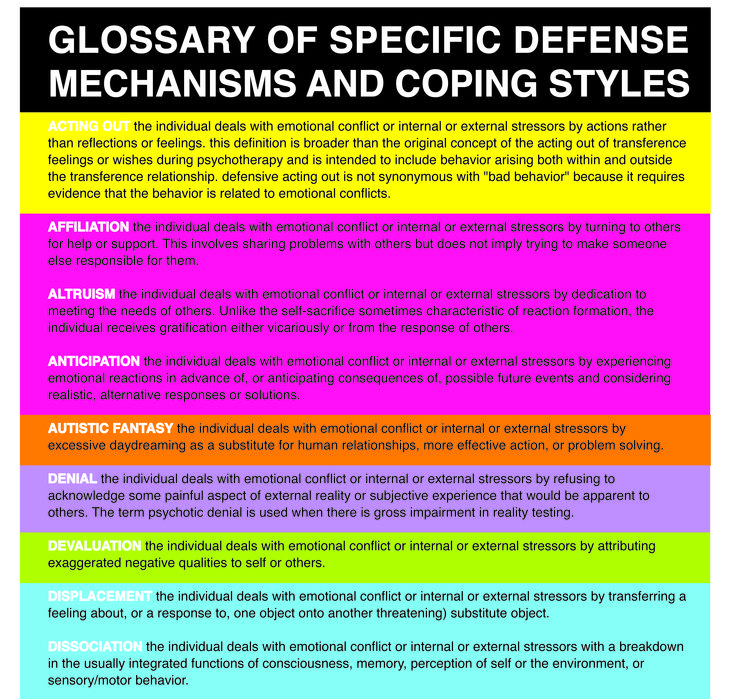 The topics that I master are remembered better if they are relevant to my work.
The topics that I master are remembered better if they are relevant to my work.
Therefore, I try to gain knowledge about everything that is even remotely related to my field of activity.
Do your best to constantly learn something new in your field. Strive to master all aspects of your work.
Recognize ephemeral knowledge and get rid of it in time
Ephemeral knowledge is information that is useful only for a short time. You need to remember that your flight is scheduled for 3 p.m. on Tuesday so you know when to pack and go to the airport. But as soon as you find yourself on a plane, this information can be thrown out of your head without any consequences - as no longer necessary.
Ephemeral knowledge can be easily forgotten and restored later. Therefore, do not waste energy on memorizing such information. Research shows that it's better to remember as Access ephemeral knowledge rather than trying to keep it in your head.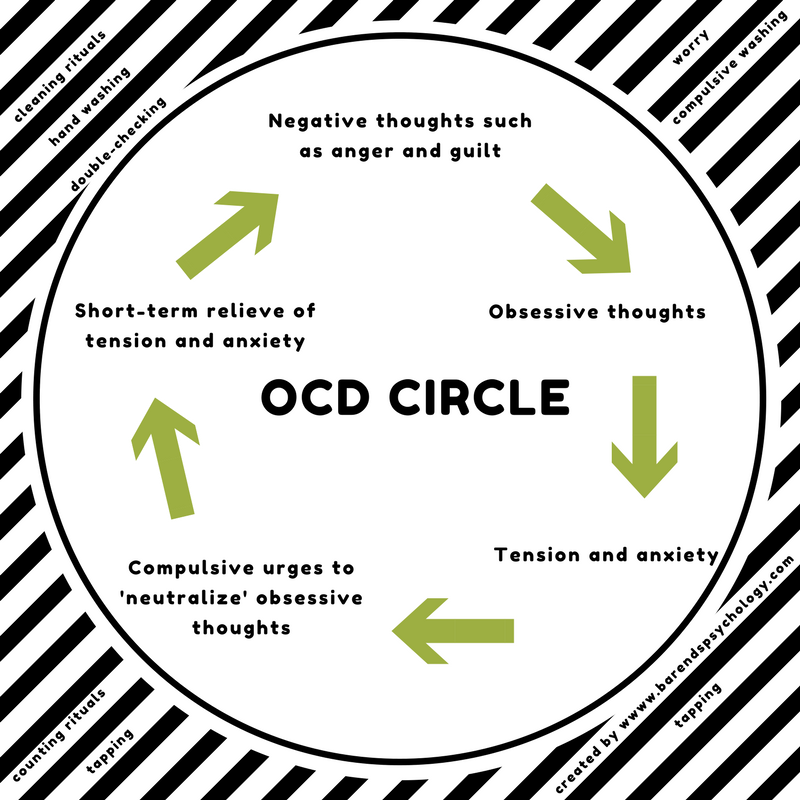
Here are a few examples of such information (I don't even try to remember this information because I know where to get it if needed):
- The day my colleague left for work (this is written in my calendar).
- Inverse Vincenty equation (there is a Wikipedia for such things).
- What Nothofagus pollen looks like (see reference book).
- Do I need a visa to travel to a particular country (Google will help here).
I have this information stored in many places at the same time. For example, I enter something in my notebook and at the same time make a note on the calendar with a detailed description. I email a note to myself and then forward it to my messenger so it's available on all my devices. I even use sketches on scraps of paper.
But if it's possible to save yourself the trouble of remembering things and deal with them right away, do it. For example, if you think you'll forget to send an email to a client, send it now, without delay. At the same time, save time for more pressing things.
At the same time, save time for more pressing things.
What is the result
I have adapted to my ADHD and it helps me in my life and career. You can do it too. I won't pretend it's easy, but progress is progress.
My goal was to deal with the two main symptoms of ADHD: procrastination and forgetfulness. And I had two strategies:
- Against procrastination: avoid direct interaction with the procrastination monster.
- Against forgetfulness: learn what is really important and weed out ephemeral knowledge.
I hope that my experience will be useful for you.
Read also 🧐
- How to manage attention and concentrate
- What really goes on in a procrastinator's head
- How to Recognize and Help a Child with ADHD
The "A" Word Psychological World
The work of Jerome Schultz, Ph.D. suggests that when people who have ADHD (in his case, children) don't understand the label " ADHD", take on the negative stereotypes often associated with the condition, rather than seeing themselves as a larger "whole".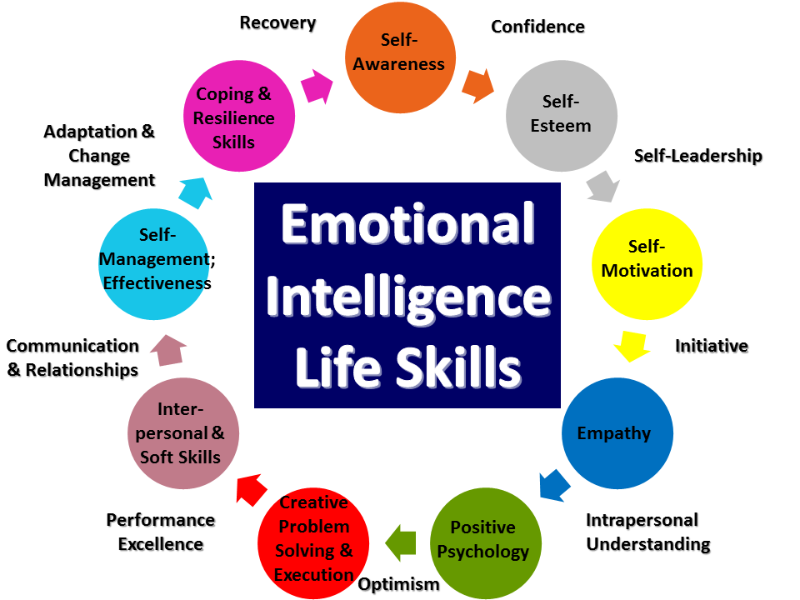 It's not a big surprise. All you have to do is stand in the school hallway for a while before you hear "Oh, that's so ADD!" It's not a compliment.
It's not a big surprise. All you have to do is stand in the school hallway for a while before you hear "Oh, that's so ADD!" It's not a compliment.
Adults with ADHD know this all too well - they've lived through it. For years, people have told them that they are inadequate, should try harder, never study, or be stupid (because they felt bad or had memory problems)… the list goes on and on. Unfortunately, many of them considered it because they had no other explanation. Take "stupid" - a child with ADHD may be exceptionally smart, but bad at testing because he/she is slow to read (a common problem with ADHD) and ends. Or perhaps she did her homework and studied the material, but forgot to bring it to school, getting a "0" for her efforts. Or was distracted and didn't even know she had homework to do, even though she's perfectly capable of handling it. Perhaps a child with ADHD had a joint math learning ability, such as dyscalchulia, that prevented him from completing more than 5 problems on that 25-question math quiz in second grade. That brain that can't calculate can be amazing words or pictures... but that gets lost in our school environment of "learning to test" and ridicule from other students.
As adults, people diagnosed with ADHD are often relieved to hear about their diagnosis. Finally! The reason for everything that happened to them! And, if they do some research and tackle the challenge of treating ADHD, their lives most often change for the better*.
But over time, if both partners don't really learn about ADHD and how to live with it, ADHD can turn into a curse - "The Word" as one woman told me. Having a label - and especially the "ADHD" label - can translate to "because you have ADHD, our relationship problems are all your fault." The woman with ADHD, who usually stays on top of things, doesn't just decide that she "doesn't feel like doing the hassle right now"... no, she "doesn't control her symptoms well enough" and is corrected by her partner. A person with ADHD who stays on their computer too long to finish reading an interesting piece of news "has a computer addiction. " A person who only cares about arriving at the airport at the very last moment is considered "inattentive" and has a "time management problem" by his more anxious and less adrenaline-driven partner.
" A person who only cares about arriving at the airport at the very last moment is considered "inattentive" and has a "time management problem" by his more anxious and less adrenaline-driven partner.
- Carol Gilligan In Another Voice: Role and Morality
- The Law of Attraction Revisited
- Where Have All Our Values Gone?
- Is Jody Arias a narcissist?
- Terrible Mind
One frustrated person with ADHD told me, "I think of it as a voice puzzle." My wife, who doesn't have ADHD, might change her mind, and that's okay. I, on the other hand, should never change my mind, because if I do, it means I'm "ADHD insecure."
This is part of the parent/child dynamic that is so destructive in a relationship that affects ADHD. An ADHD partner who has a child role has little autonomy and is constantly criticized by non-ADHD and other ADHD partners who believe their path, sanctioned by the neurologically typical world, is "better." Sometimes they have a point.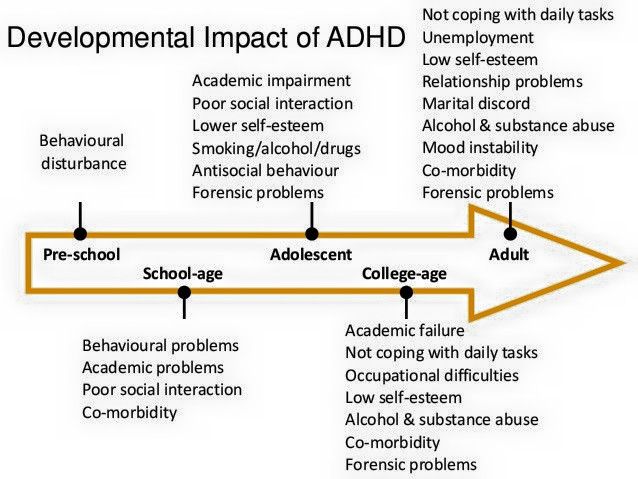 .. but not as often as they think. And ADHD is not always the cause of controversy. As a non-ADHD partner, I may prefer to get to the airport earlier so that I don't feel stressed out. But as long as my ADHD partner does it on time, is my path really more successful (“better”) than his? Objectively, no. We do things differently. Viva la difference!
.. but not as often as they think. And ADHD is not always the cause of controversy. As a non-ADHD partner, I may prefer to get to the airport earlier so that I don't feel stressed out. But as long as my ADHD partner does it on time, is my path really more successful (“better”) than his? Objectively, no. We do things differently. Viva la difference!
I'm not the one who thinks ADHD is a gift. I have seen him play a part in the suffering of too many couples. Research supports me. Having ADHD can wreak havoc on your life. But... and this is a big one, but... it's not all about ADHD. Using the ADHD label without empathy or compassion is just cruel. Dysfunction in the couples I work with comes from their interactions and relationships regarding ADHD, as well as the symptoms of ADHD. Using "ADHD" as a criticism - as "The Word" if you will - is one of the big problems. This signals disrespect and a willingness to label the other in such a way that the other partner can ignore their role in their joint problems. .. which has resulted in significant less than optimal healing.
.. which has resulted in significant less than optimal healing.
- Shy children and caregivers with tails: how dogs improve children's reading skills
- Narcissistic love patterns: the recycler
- Is health insurance Anti-Life?
- Why do boys really need dolls for a boy
- Parenting because of the bars
Non-ADHD partners, teacher, parents and anyone who loves someone with ADHD will listen well to understand how many of us read label "ADHD" ... and remember that it's not just about ADHD. A person with ADHD is much more than his or her ADHD symptoms and deserves autonomy and respect for his or her different way of being.
* Research by Dr. Russ Barkley and Dr. Kevin Murphy shows that the majority of adult ADHD patients who use medication see significant improvements in symptom management. See Barkley's book, "Considering Adult ADHD" for more information.

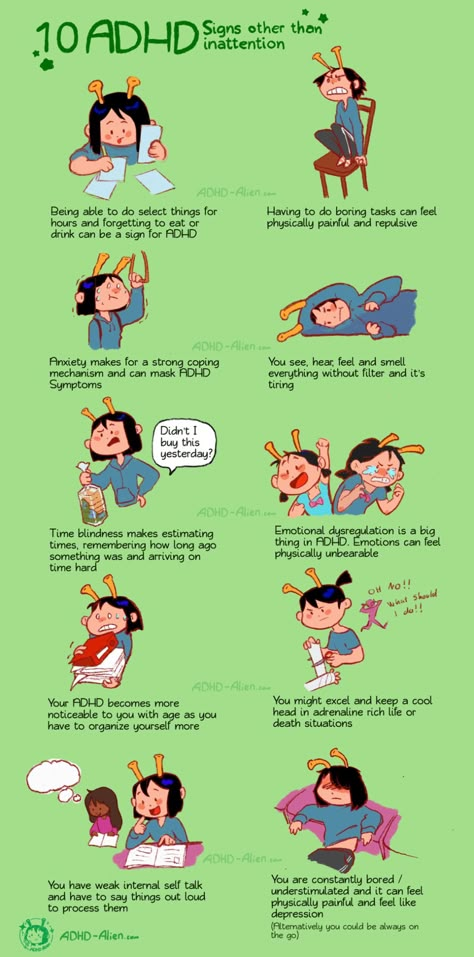
 Once you become accustomed to using strategies to help yourself, you may find that managing your symptoms becomes second nature.
Once you become accustomed to using strategies to help yourself, you may find that managing your symptoms becomes second nature.

